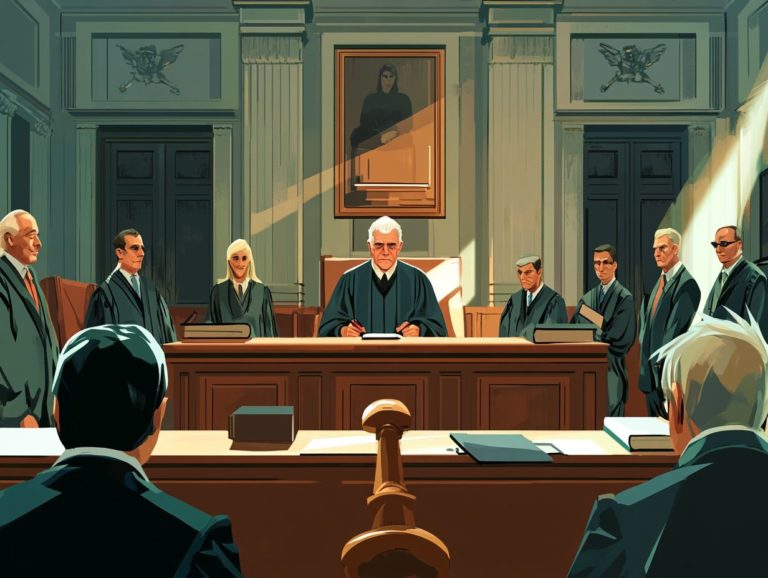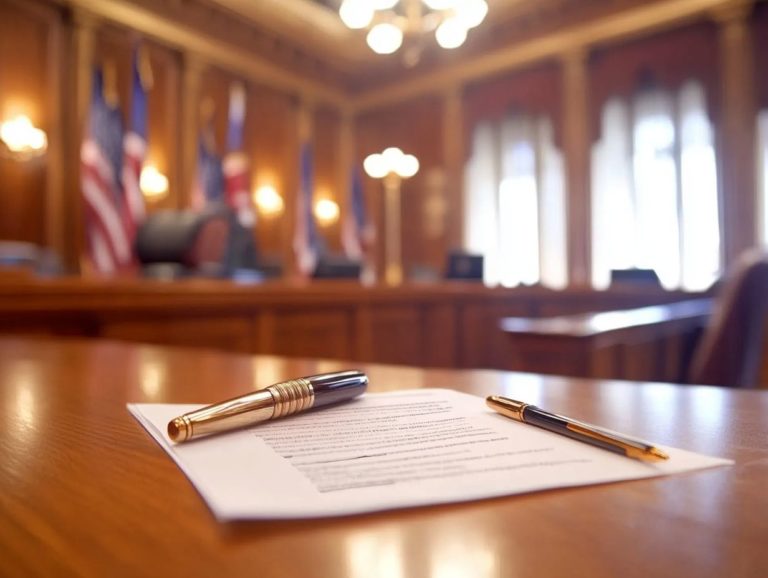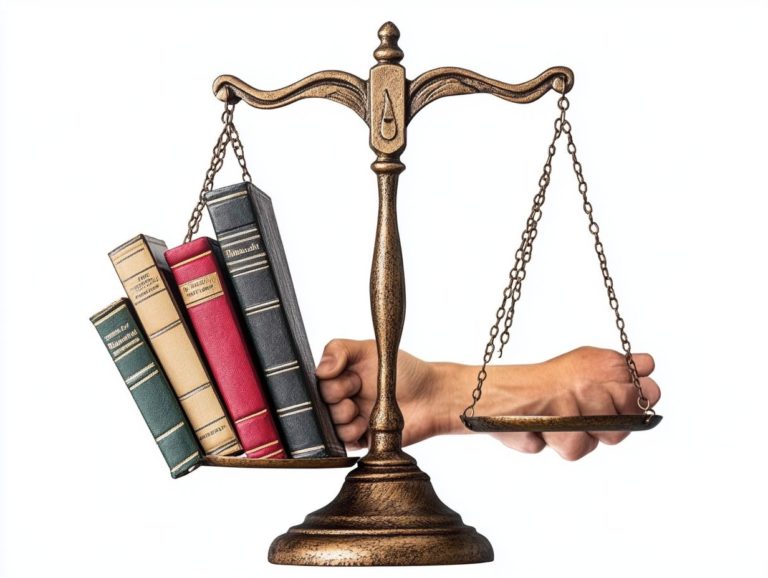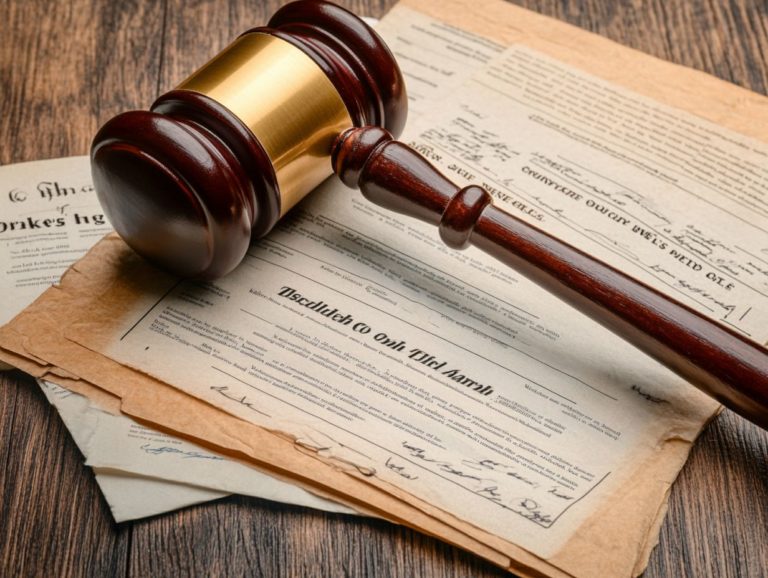The Costs Associated with IP Litigation
Intellectual Property (IP) litigation can feel like an imposing fortress for businesses and individuals alike, often accompanied by substantial financial strains.
Grasping the nuances of legal fees, court expenses, and the many factors that shape these costs is essential for anyone venturing into this intricate domain. From the nature of the IP at play to the specific jurisdiction, several elements significantly influence your overall expenses.
This article will unpack the various types of costs linked to IP litigation and present effective strategies to manage them, ensuring you are thoroughly equipped to tackle the challenges that lie ahead.
Contents
- Key Takeaways:
- Overview of IP Litigation Costs
- Factors that Affect IP Litigation Costs
- Types of Costs Involved in IP Litigation
- Strategies for Managing IP Litigation Costs
- Frequently Asked Questions
- What are the costs associated with IP litigation?
- Are the costs associated with IP litigation typically high?
- Can the costs associated with IP litigation be predicted in advance?
- Are there ways to minimize the costs associated with IP litigation?
- Who is responsible for covering the costs associated with IP litigation?
- What are the potential consequences of not being able to afford the costs associated with IP litigation?
Key Takeaways:
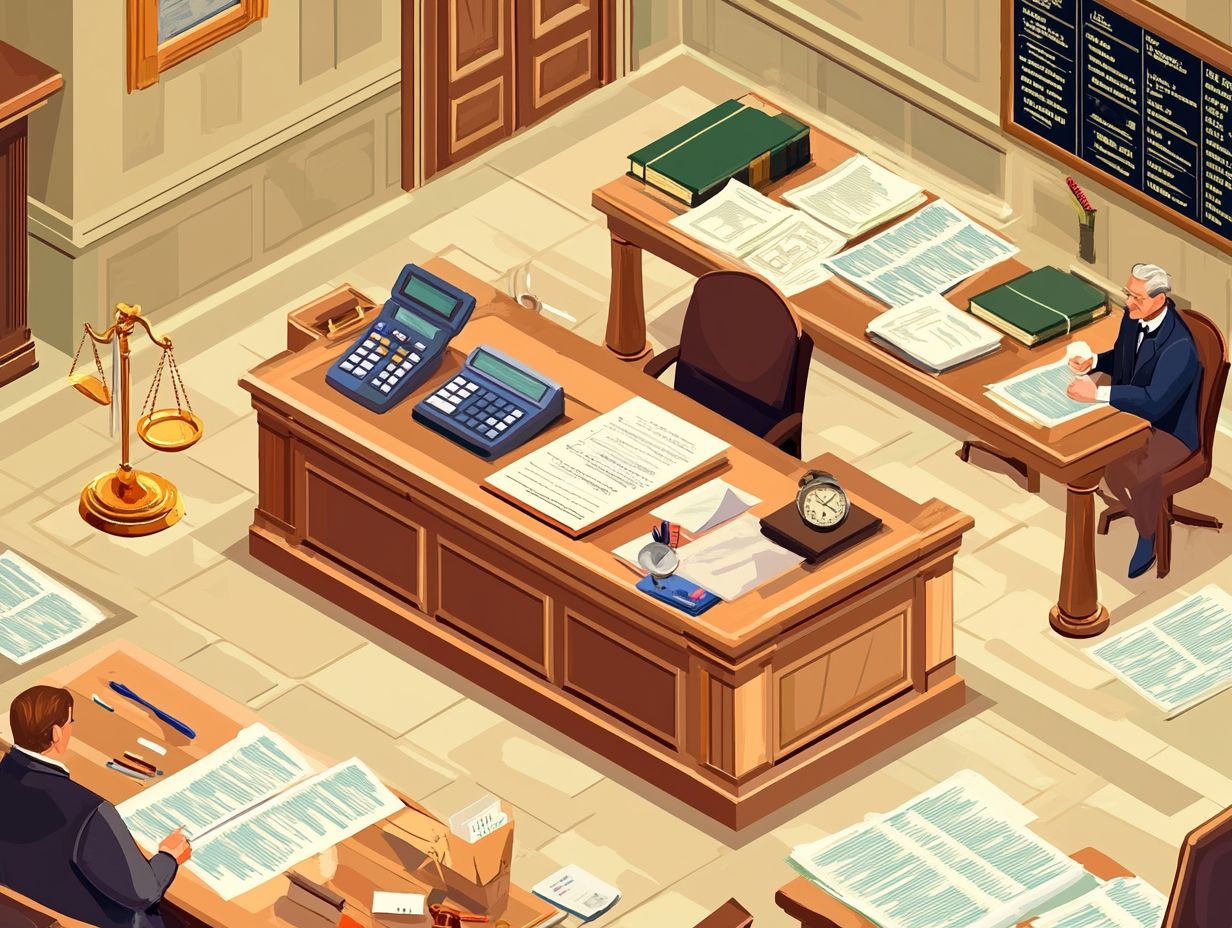
- IP litigation can be expensive due to legal fees, expert witness fees, and other costs associated with the case.
- The type of intellectual property, complexity of the case, and location can all impact the overall cost of IP litigation.
- To manage IP litigation costs, consider alternative dispute resolution options and implement budgeting and cost control measures.
Overview of IP Litigation Costs
Knowing IP litigation costs can make or break your case! Understanding this landscape is vital for you as an IP holder navigating patent litigation, copyright infringement disputes, or trade secret protection cases.
Legal fees and litigation costs can fluctuate significantly depending on the complexity of your case and the specific type of intellectual property at stake. The jurisdiction in which you file also plays a critical role.
Managing these costs effectively is essential for maximizing your economic value and ensuring that resources are allocated efficiently to protect your exclusive rights and recover damages.
This overview will explore the factors influencing these costs, the various types of expenses you might encounter, and strategies to manage them effectively.
Explanation of Legal Fees and Expenses
Legal fees and expenses in IP litigation are pivotal elements that can significantly affect your financial standing and overall strategy when addressing infringement cases.
These costs encompass various components, starting with attorney fees, which fluctuate based on the case’s complexity and the expertise of your legal counsel. Court costs, including filing fees and expenses related to witness testimonies, also come into play.
As an IP holder, you must weigh potential expenses for expert witnesses, mediation, or settlement negotiations. The financial strain of these fees can shape your decision-making process, potentially nudging some holders to settle early rather than risk escalating costs during a prolonged litigation battle.
You must consider whether the potential damages justify the costs quickly! The possibility of recovering damages in court becomes a crucial consideration; the anticipated financial return must surpass the expenses incurred to justify pursuing legal action.
Factors that Affect IP Litigation Costs
Several critical factors will influence your IP litigation costs, including the type of intellectual property at stake, the complexity of your case, and the location and jurisdiction of the legal proceedings. Understanding the importance of IP education in litigation can also play a significant role in managing these costs effectively.
Each of these elements impacts your litigation strategies and potential outcomes, affecting everything from legal representation expenses to attorney fees and the tools you ll need in the process.
Grasping these factors is essential for both plaintiffs and defendants, as they can lead to substantial variations in legal expenses and dictate your overall approach to managing IP rights protection.
Type of Intellectual Property Involved
The type of intellectual property at play in a case be it patents, copyrights, or trademarks significantly impacts both the litigation costs and the economic value perceived by you, the IP holder.
For example, when you find yourself in patent litigation, expect extensive technical expert witnesses and complex legal arguments to drive up costs and extend trial durations. On the other hand, trademark disputes tend to be more straightforward, primarily focusing on brand recognition and consumer confusion, which can lead to quicker settlements.
Copyright cases, however, can be a mixed bag. Simpler infringement claims might require fewer resources, while high-stakes battles over creative works can escalate into expensive legal skirmishes.
A striking illustration is the Apple vs. Samsung patent war, which not only sapped resources but also set industry standards. This contrasts sharply with smaller-scale trademark disputes, which often resolve through negotiation rather than enduring courtroom conflicts.
Call to Action: If you’re navigating IP litigation, consider seeking legal advice or exploring effective cost management strategies tailored to your case!
Complexity of the Case
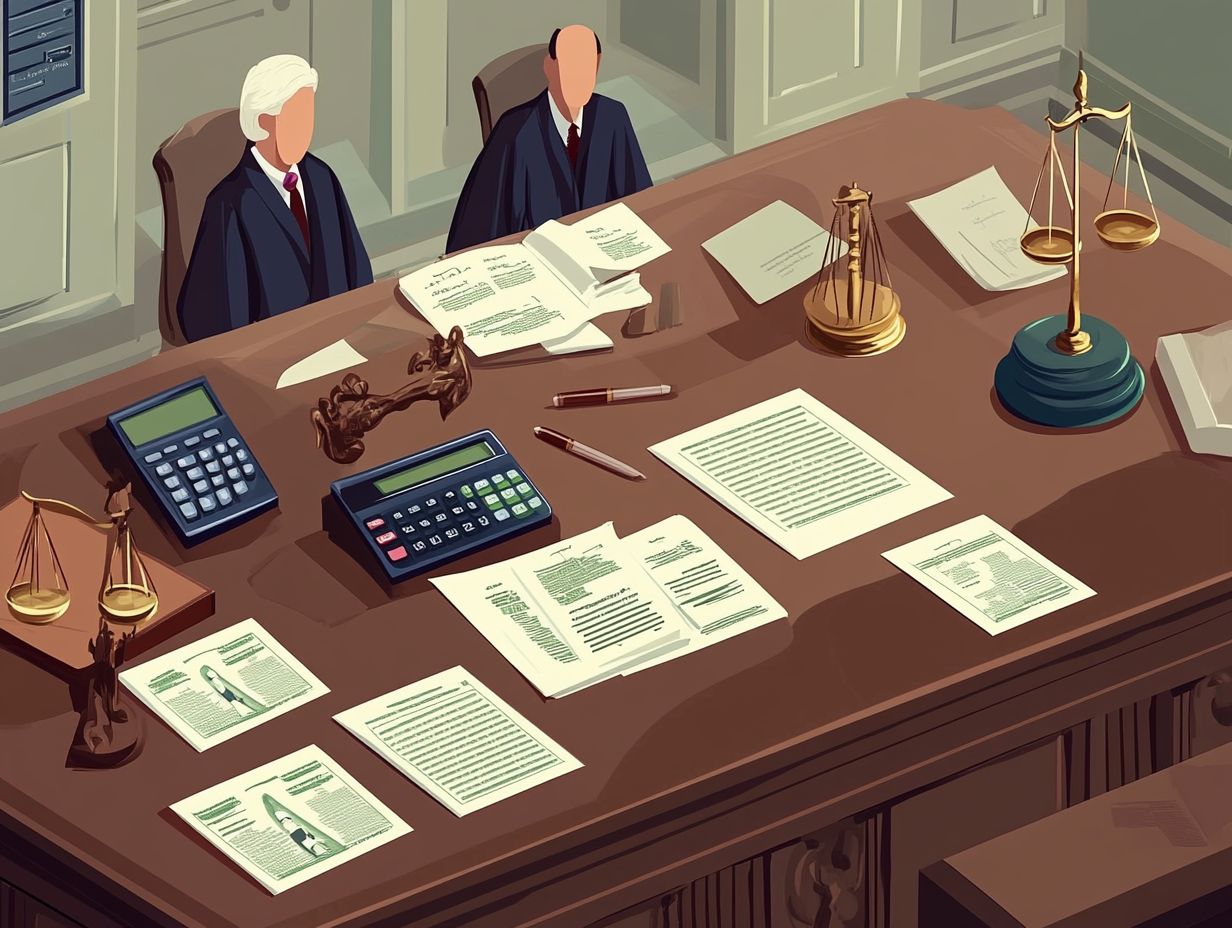
The complexity of an IP litigation case directly impacts your costs. Intricate cases often require extensive legal representation and expert witnesses.
Expert witnesses can significantly bolster your case’s credibility. However, they also increase your financial burden due to their specialized knowledge.
Gathering and analyzing evidence is time-consuming and costly. The intricacies of understanding legal claims require a clear grasp of legal standards, complicating the process.
These factors tend to inflate litigation costs. It s essential to assess your strategies carefully.
Location and Jurisdiction
The location and jurisdiction where you file an IP case can greatly impact your costs. This affects everything from attorney fees to court decisions.
Legal frameworks and procedural rules can vary significantly across jurisdictions. Some regions impose higher court fees or have more complex filing processes.
Federal regulations also play a role, often intersecting with local laws. This influences how cases are managed and shapes your strategy.
Understanding both local and federal laws is vital for effective cost management and optimal outcomes.
Types of Costs Involved in IP Litigation
IP litigation involves various costs you need to consider. These include attorney fees, court costs, expert witness fees, and discovery expenses.
Each cost element contributes to the total you face during litigation. Understanding this financial landscape is crucial for planning.
Attorney Fees and Court Costs
Attorney fees and court costs are among the largest expenses in IP litigation. Understanding what to expect during an IP litigation process can often dictate whether pursuing or defending a case is economically viable.
These expenses influence the strategies of both plaintiffs and defendants. They must evaluate the potential return on investment of legal actions.
Given the unpredictable nature of litigation, many weigh the benefits of settlement against courtroom costs.
Understanding different fee structures hourly rates, flat fees, or contingency arrangements is essential. This knowledge helps in making informed choices.
Reviewing court costs, including filing fees and discovery expenses, complicates the decision-making process.
Expert Witness Fees
Expert witness fees can significantly impact your litigation costs, especially in complex cases. Their testimony is crucial for presenting evidence and assessing damages.
Costs for hiring experts vary based on experience and case complexity. Clear communication with experts ensures they focus on critical case elements.
Strategically leveraging expert witnesses enhances your arguments. This approach clarifies complicated issues and improves your chances of success.
Discovery and Deposition Expenses
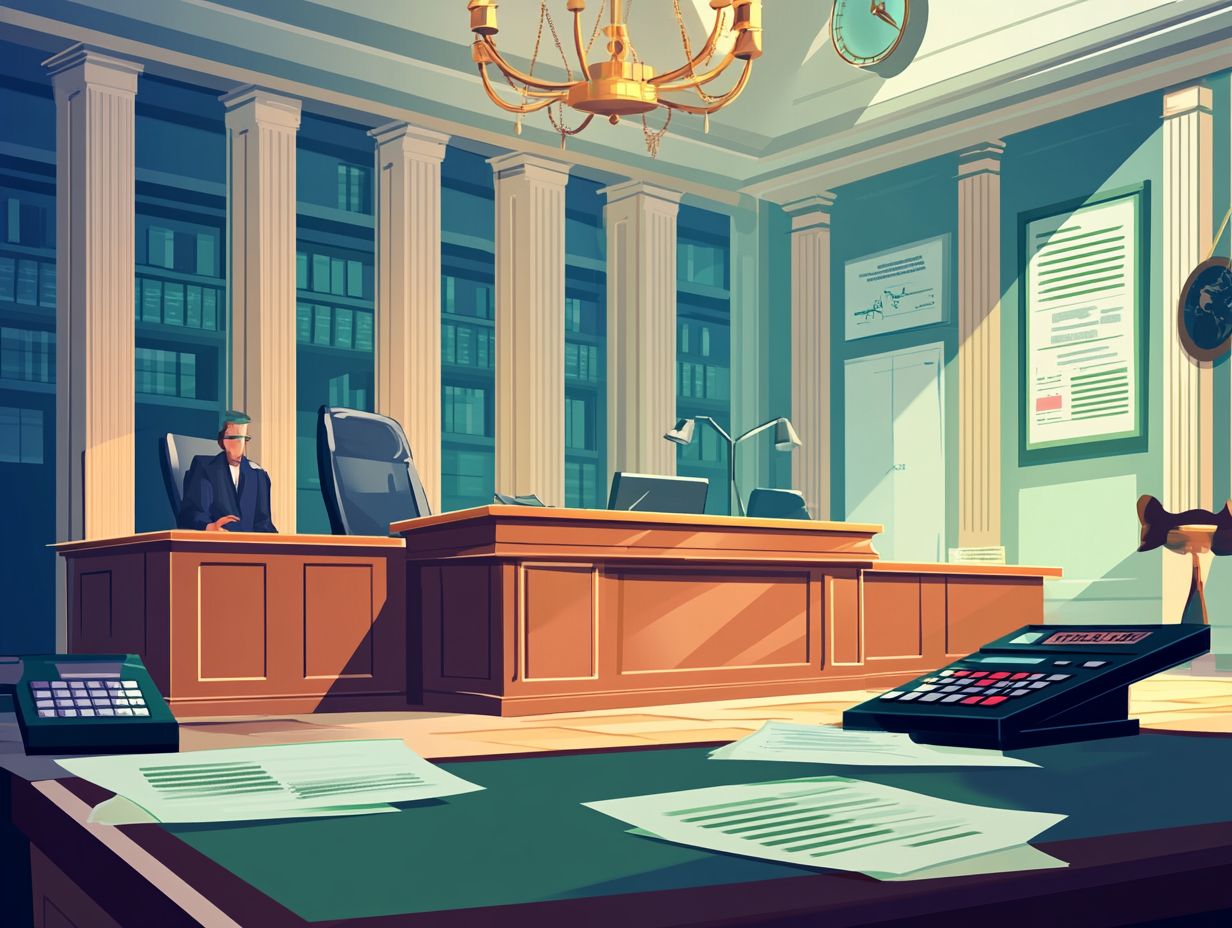
The discovery process and deposition expenses are critical in IP litigation, significantly impacting your overall costs.
This complex phase requires you to gather evidence and interrogate witnesses. You must also exchange relevant documents with all parties involved, demanding careful planning and organization.
The ramifications of these activities extend beyond just costs; they also impact the timeline of legal proceedings and can sway settlement negotiations. Effectively presenting evidence during this stage not only bolsters your position but also enhances the judge’s or jury’s understanding of the case.
Therefore, prioritizing organization and clarity in your evidence presentation is essential for navigating the intricacies of intellectual property disputes with efficiency.
Strategies for Managing IP Litigation Costs
Implementing effective strategies to manage IP litigation costs is essential for you as an IP holder who aims to protect your rights without breaking the bank.
Exploring alternative dispute resolution options can be an appealing choice, allowing you to safeguard your interests while keeping legal expenses in check.
Alternative Dispute Resolution Options
Alternative dispute resolution options, such as mediation and arbitration, are becoming the preferred choice for IP holders like you who want to resolve disputes over intellectual property rights efficiently.
These methods provide a more streamlined process, allowing you to reach agreements much faster than you could in the often lengthy and complex court system. They offer greater flexibility, enabling customized solutions that traditional litigation may not accommodate.
This adaptability is especially advantageous for IP holders, as it allows you to create outcomes that align more closely with your unique circumstances. The combination of time efficiency and potential cost savings makes these alternatives particularly attractive.
They give you the power to concentrate on your core business activities instead of getting bogged down in protracted legal battles.
Budgeting and Cost Control Measures
Budgeting and cost control are essential for IP holders. Managing your resources wisely can ease the financial burden of legal proceedings.
By embracing strategic financial planning, you can understand the legal process better and plan effectively. Consider employing various budgeting techniques, such as zero-based budgeting, to ensure that every expense is justified.
Implement cost control measures, like setting strict billing guidelines for your legal counsel, to reduce risks. You might also want to explore alternative fee arrangements with attorneys, such as flat fees or contingency billing, to enhance the predictability of your overall expenditures.
Regularly reviewing and adjusting your budget throughout the litigation process will help you identify opportunities for cost-cutting or strategic investments, ensuring your financial sustainability as the case unfolds.
Frequently Asked Questions
Here are some common questions about the costs of IP litigation.
What are the costs associated with IP litigation?
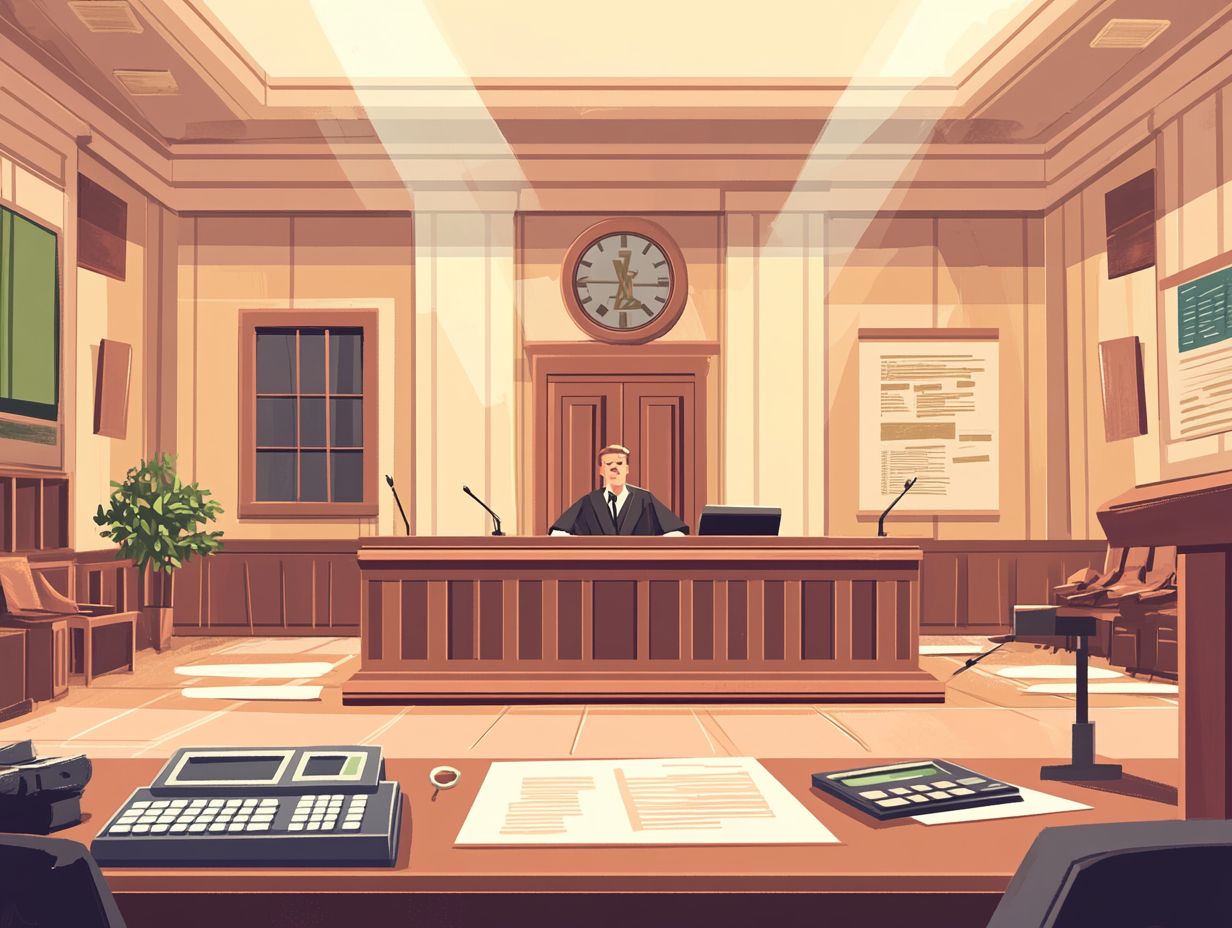
The costs associated with IP litigation can include attorney fees, court filing fees, expert witness fees, travel expenses, and potential damages or settlements. However, it’s also crucial to understand the costs of not engaging in IP litigation.
Are the costs associated with IP litigation typically high?
Yes, the costs associated with IP litigation can be quite high due to the complexity and specialized expertise required in these cases, which can significantly affect small businesses, as discussed in the impact of IP litigation on small businesses.
Can the costs associated with IP litigation be predicted in advance?
It can be difficult to predict the exact costs of IP litigation as they vary depending on the complexity of the case and the length of the legal process. However, an experienced IP attorney can provide a rough estimate during the initial consultation.
Act now to protect your intellectual property and avoid costly battles later.
Are there ways to minimize the costs associated with IP litigation?
Yes, there are several ways to cut costs in IP litigation. You can negotiate a settlement outside of court, use methods like mediation or arbitration, or hire a skilled IP attorney to handle your case efficiently.
Who is responsible for covering the costs associated with IP litigation?
The party bringing the lawsuit usually covers the costs of IP litigation. Some agreements might allow for sharing or shifting these costs.
What are the potential consequences of not being able to afford the costs associated with IP litigation?
If you can’t cover these costs, you may have to drop your case. This could lead to losing your intellectual property rights, resulting in serious financial and reputational damage.

